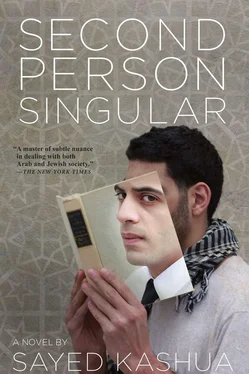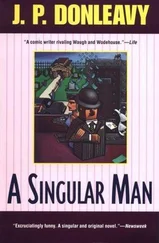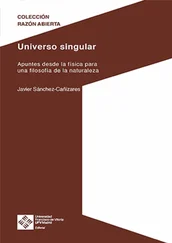I don’t know how to dance. I’ve been to very few weddings, and that’s where everyone learns to dance. In Jaljulia no one knew us well enough to invite us to any weddings, and in Tira we were simply not invited. I stood on the dance floor, not moving a muscle, while Leila moved gracefully before me. She smiled the whole time and it did not seem that she minded that her partner was just standing there like a lump of clay. Slowly I managed to convince myself that no one was watching me, that everyone there had something better to do than watch me dance, and I began to move my body. I imitated what the men around me were doing and I kept a safe distance from Leila, reminding myself that she was a colleague. All of a sudden I froze, realizing that someone was watching me. The guy next to me moved, and past him I saw Khalil. He raised a bottle of beer, offering me a silent cheer, and then burst out laughing. Shadi and Walid were sitting beside him. I didn’t move. I could just hear their comments and their sniggering. I could read the ridicule in their eyes. Leila noticed that something was bothering me, looked over at their table, and then turned back to me, still dancing, and made a who cares? shrug with her shoulders and a scrunching up of her face. She tried smiling again and went on dancing but she realized that I was no longer there, on the dance floor at the Orient Express. Five minutes later I told Leila I was leaving, and did not wait for a response.
Leaving Yonatan’s place and walking toward the bus stop on Herzl Boulevard, everything became clear. Enough. This cannot go on. I’ll put an end to it today. I had a clear vision of exactly how I was going to change my life. Images of the revolution played in my mind. I was done turning the other cheek. Why should I let those jerks dominate me? How had I let myself be so stupid, leaving Leila like that?
Ruchaleh’s white car pulled into the bus stop. “You going to the office?” she asked.
“Yes, thank you,” I said and got in.
If she says anything about the clothes, I won’t so much as apologize, I told myself. I’m done being scared. Completely done. If she says one word, I’ll get out of the car and never come back to her son’s stinking attic. I don’t need this crappy job.
But Ruchaleh did not mention clothes. She said nothing the entire time. She drove quietly, as always, her face very much like Yonatan’s, her gaze, like his, fixed nowhere and everywhere. In my head I heard Metallica’s slashing guitars, my soundtrack for the morning’s revolution. I imagined myself in the office, standing tall, head and shoulders above everyone else, yelling, putting them back in their places, and they, my colleagues, cowering, silent, the smiles wiped off their faces, understanding that their days of toying with me were over. Or maybe I should forget the office and go straight to Leila’s dorm? I’ll buy flowers and wait for her by the entrance to the building. I’ll stand there for all to see, even her roommate with the hijab and I’ll give her the flowers and I won’t even whisper when I say, “I love you.”
“Thank you,” I said to Ruchaleh as she pulled the car up to the front of the building. I walked differently. I could feel it in my feet and hear it in the sounds of my shoes. I felt like a new man, strong, proud, unafraid, marching toward a revolution with a spade in one hand and a rifle in the other.
It was eight in the morning and I had a solid two hours before anyone would come into the office. I imagined Khalil coming in first, smiling at me and saying, “What, just like that you leave a girl hanging?” I won’t say a thing to him. Not a word. I’ll wait for everyone to show up, wait for them to start their day, their usual gossip and sniggering, and then, when they pull out their change for the breakfast run, I’ll throw it back in their faces and launch my attack. I won’t be defensive in any way. I’ll stay on the attack, my face burning with rage. I’ll show them who’s a wimp. I’ll show them how lame it is to think every girl in the world is just a pair of legs and an ass. I don’t care if Walid’s there or not. I won’t yell at him, but I’ve got no problem letting him hear what I think of my colleagues. I could see them sinking into their chairs and me going back to work as though nothing had happened, my chest threatening to burst with pride.
“A battle,” I heard my mother’s voice say, just as she did whenever I stood before her, bruised but not crying, and she knew I had been beaten up again on the way back from school. “A battle,” I could hear her say, “is like when two people bite each other’s fingers. It hurts both of them but the loser is the one who admits it first.” (Only later did I learn that she had been quoting from some Vietcong revolutionary whose book she had on her shelf.)
I remembered that sentence well, even though it had never been relevant to me. I never felt like I was biting anyone’s finger; it was only my finger in my adversary’s mouth and I never thought there was any chance that he would cry out before me. I never fought back. I just tried to deflect the blows as best I could and then run away. Just like my mother, who ran away, too, years before I ever had to, and who explained that she had done it because of me, for me, because she didn’t want me to suffer, to feel unwanted and alienated. Later she told me that she didn’t run away so much as sneak me away, just as she did again in the middle of the school year in elementary school when she heard that I was being picked on, this time smuggling me into a Jewish school in Petach Tikva, using every last one of her connections with the teachers union. I went to that school for two years and I liked it a whole lot better. No one told me that my father had murdered anybody or that I was the son of a collaborator. The kids simply did not speak to me and I did not speak to them. I was good in school, though, and soon enough I learned the language, learned to speak like them, and even started writing better than most of them.
When Mom made me go back to Jaljulia for junior high, I started to cry, but she said it wasn’t up to her, that the school guidance counselor had said that I wasn’t getting along in Petach Tikva, that it was not the right place for me. In junior high and in high school I was no longer beaten up, because my mother was a teacher at the school and she kept a close eye on me. Twice a day at least she would come into class and ask how I was doing. That’s when I started to keep my distance from her and today I regret that I can’t so much as imagine a hug from her.
Five minutes after I arrived at the office, the images of the revolution started to fade. I remembered that it was Leila’s day to come into the office and that she would be in soon. I left the room, locked the door, told the janitor that I wasn’t feeling well, and asked him to tell Walid that I had gone to the doctor. I punched my card and left. That evening I left for Scout Street half an hour early. I got off the bus near the courthouse and walked in the dark to the empty office, holding an envelope and a printed letter. The text was short. Beneath the date and the subject I had written, I quit, and beneath that I had scribbled my signature. I knew that no one would come looking for me. I pushed the envelope into Walid’s mailbox.
In my box I saw a small piece of paper. It said, I waited for you, but you didn’t come. I hope everything’s all right. I wanted to thank you for last night. It was wonderful. Call me tomorrow?
The lawyer put out his cigarette, opened the study door, and crept up the stairs. His wife’s cell phone was charging on a table in the living room. The lawyer went into the bedroom where his wife and son slept. Out of habit, he held his breath, listening for the sounds of his son’s respiration. By the foot of the bed he found his wife’s leather attaché case, the one he had bought her for her twenty-seventh birthday. Of course, it was on the floor. She always peeled off her clothes, kicked off her shoes, and dumped her bag on the floor, a habit that the lawyer had attributed to carelessness or the permanent frenzy of a woman returning from work to a house full of children. Now, though, as he lifted the bag, he realized that her behavior, the scattering of her belongings despite his protestations, was a sort of revolt, a statement, a piece of writing on the wall that any clear-eyed person would’ve understood.
Читать дальше












